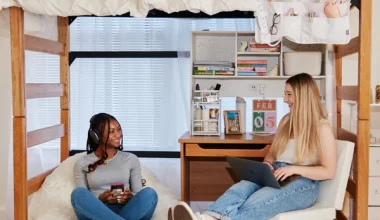Starting college is a huge step, filled with excitement and maybe a touch of nervousness. That’s normal! College orientation is here to help you with that transition. Serving as a crucial stepping stone to help students transition smoothly into college life and make the most of their academic experience.
During college orientation, students participate in various activities to introduce them to campus resources, academic expectations, and classmates.
In this article, we’ll break down everything you need to know, from registering for classes to finding your way around campus. You’ll be a college pro by the end, confidently walking to your first class!
Table of contents
What is College Orientation?
College orientation, also known as freshman orientation or new student orientation, is a program or series of activities designed to help incoming students transition smoothly into college life. It is typically held before the start of the academic year and provides an opportunity for new students to become familiar with the college campus, resources, policies, and community.
The purpose of college orientation is to help students adjust to college’s academic, social, and cultural aspects. It serves as an introduction to college expectations and offers support and guidance during the early stages of their college experience.
Orientation programs are usually organized by the college’s student affairs department and involve collaboration with various campus departments, student organizations, and current students.
READ ALSO: College Dorm Parties: A Freshman Guide To Throwing An Epic Party
What are the Benefits of Attending College Orientation?
Orientation programs are usually organized by the college’s student affairs department and involve collaboration with various campus departments, student organizations, and current students.
Here are some advantages of attending college orientation programs:
1. Make Friends Before Classes Start
Concerned about making friends on campus? So is everyone else; don’t worry (even if they won’t confess it). The opportunity to meet new people, bond through awkward icebreakers, and learn about your new home together is provided by attending college orientation. Even if you don’t become best friends, you’ll know a few familiar people are waiting for you when courses start.
2. College Orientation Will Help You Find your Way Around Campus
The orientation program frequently includes in-depth guided tours, especially at large universities. Additionally, you’ll get an opportunity to explore independently, so you’ll feel comfortable traversing the campus on your first day.
You may want to see: 30 Dorm Room Essentials for Guys in College | 2024
3. Learn About Your College’s Resources
On the admissions tour, you probably heard a summary of the resources at your college. The time has come to learn more. Learn what to do if you become ill. Find out where to go for tutoring if you’re having trouble in class. Look up the hours of the recreation centre. Even while you might not use all of your college’s resources, it’s still a good idea to be aware of them in case you do.
4. You Will Be Taught how to Register for Classes
At college orientation, you’ll meet with an academic advisor. If you’ve already chosen a major, they’ll review the general education requirements for your degree and go through any prerequisites, classes, or internships that could be necessary. They can also assist you in choosing courses for your first semester and finishing the registration process.
READ ALSO: 10 Best Dorm Room Desk For Reading in College | 2024
5. Explore Campus Activities
Campus activities are a terrific way to discover your passions, experience new things, and make lifetime friends. College is so much more than simply the classroom. During college orientation, you’ll learn about all the extracurricular activities offered at your school (USF has more than 700 across our three campuses), including Greek life, drama, and student government. Remember Becca’s dad’s wise counsel from Pitch Perfect: “This is college. Take part!”
6. You Will Get to Visit the Residence
Are you looking forward to living on your own? Attending college orientation is your first chance to experience it! Many colleges require an overnight stay in a residence hall where you can see what it’s like bunking with a roommate and chowing down in the dining hall. You might even come home with a few ideas to make your home-away-from-home more comfortable.
READ ALSO: 35 Best Dorm Gifts College Students Will Love
What Happens During College Orientation?
Orientation looks different depending on the college, but there are some basics all schools will likely cover during this time. Here are five things to expect at your college orientation.
1. Campus Tours
The campus tour is one of the most significant components of freshman orientation. It’s a good idea to take another tour, even if you already did one before choosing to attend. You can get a better sense of the campus by taking a tour. Additionally, it can aid in your decision to enroll in nearby classes.
Additionally, current students frequently lead tours and can give you a unique perspective on where to eat, study, and mingle on campus.
2. Information Sessions
During college orientation, students and parents will probably have access to numerous informational sessions. These workshops might cover topics such as move-in day, academic support, FERPA privacy rules, financial aid, the billing process, and campus safety and security.
3. Dorms and Roommates
During orientation, you may get to visit your dorm. By this point, most schools will have assigned you a roommate or asked you to designate one.
Many colleges and universities require students to use online roommate matching services or assign a roommate based on the questionnaire you fill out. Specific colleges like Stanford University may assign you a roommate at orientation.
Orientation is a fantastic opportunity to meet your new roommate in person and begin making plans for your future dorm life.
4. Meeting People and Making Friends
You’ll meet people on campus wherever you go and get to know them through informative sessions and your orientation group.
Before the semester begins, be open to developing relationships and friendships with new people. Everyone will probably be more receptive to forming friendships because many college students have left some, if not all, of their friends behind.
READ ALSO: 50 Best Multiplayer Games Unblocked for College & High School Students
5. Choosing Your Class Schedule
Many colleges use this as an opportunity for students to meet with their academic advisors and select their class schedules. If you are a morning person, you can attend classes in the morning.
They will also show you the lecture halls on campus, so it will be easy to locate them. Finally, look at the course catalog and balance your choices so you’re not taking all difficult classes in one semester.
How Long Does College Orientation Last?
Most college orientations last 1-3 days. Some schools hold a weeklong orientation, with activities and information sessions for incoming students, while others have just a daylong orientation.
It’s important to note that the format and duration of college orientation can vary widely. Some colleges may have a more flexible schedule, offering orientation sessions on multiple dates throughout the summer to accommodate students’ availability. Colleges may also offer virtual or online components to orientation programs, allowing students to access information and resources remotely.
Consult the orientation schedule and materials provided by your college or university for specific information about the duration of orientation.
READ ALSO: Should College Be Free: YES/NO? Pros And Cons
Must I Attend My College Orientation?
Attending college orientation is highly recommended, as it offers numerous benefits for incoming students. However, in most cases, college orientation is not mandatory. While some colleges may strongly encourage or require attendance, others may offer orientation as an optional program.
Your orientation serves as an introduction to university life and the campus and university. The orientation staff will also show you around campus, introduce you to help faculty and advisors, direct you to the right resources for questions and problem-solving, and do much more.
SEE ALSO: 13 Best Devotionals For College Students | 2024
How to Prepare for College Orientation
Here are a few ways to prepare for college orientation:
- Register: Most colleges have multiple orientation dates specified. Therefore, choose the date that works best for your schedule and then register online. Some institutions may ask you to submit your photo for photo identification, immunization records, and proof of transfer or dual credit before the start of orientation.
- Pack the right things: There may be instances where the move-in dates and your college orientation date fall on the same weekend. Bring whatever you think the dorm room would need. Bring a photo id and a bag with clothes, toiletries, and other necessities for the summer’s overnight orientation dates. On orientation day, the professionals advise dressing comfortably and wearing supportive footwear.
- Prepare a checklist: You can also make a checklist of questions that can be asked during an orientation program. These concerns can include how the institution contacts students in an emergency, what financial aid is offered to cover tuition costs, how secure the resident halls are, which most recent COVID-19 protocols are being used, etc.
FAQs
College orientation is a program or series of activities designed to help incoming students transition smoothly into college life. It provides essential information, resources, and support to familiarize students with campus facilities, academic requirements, policies, and available resources.
It is important because it helps students acclimate to their new environment, build connections with peers and faculty, understand academic expectations, and become familiar with campus resources. It provides a foundation for a successful college experience.
During college orientation, students participate in a range of activities such as campus tours, academic advising sessions, registration for classes, information sessions on campus services, social events, and workshops on study skills and time management.
Many colleges offer separate orientation programs or sessions for parents and family members to attend
Many colleges provide the opportunity to register for classes during orientation. Academic advisors or faculty members are often available to assist with course selection and guide students through the registration process.
Conclusion
College orientation is a dynamic and multifaceted experience that sets the stage for a successful college journey. It provides incoming students with essential information, introduces them to campus resources, and helps foster connections with peers and faculty.
From campus tours and academic advising sessions to information workshops and social events, orientation equips students with the knowledge and tools they need to navigate college life confidently.
By actively participating in orientation activities and embracing its opportunities, students can make a smooth transition and lay the foundation for a rewarding and fulfilling college experience. So, as you embark on your college journey, embrace the excitement and energy of college orientation and let it pave the way for a remarkable academic adventure.
References
- transferca.org – The Importance of New Student Orientation for Students
- admissionsusf.edu – Why Is Attending College Orientation Important?
- bestcolleges.com – College Orientation: 5 Things You Need to Know
- studyabroad.shiksha.com – What to expect at college Orientations?





